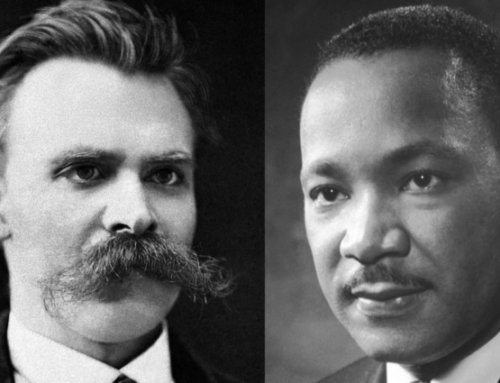Richard Weaver’s book “Ideas Have Consequences” presents the harmful effects of nominalism on Western civilization since it gained prominence in the Late Middle Ages. Many of our modern woes stem from the acceptance of nominalism and the rejection of philosophical realism back in the fourteenth century.
 By the time of his untimely death in 1963 at the age of 53 years old, Richard Weaver was considered a leading intellectual historian, philosopher, and mid-twentieth-century writer. Those who have read about Weaver’s life are aware that, at his core, he was a man who enjoyed solitude and books. Russell Kirk once therefore wrote that Weaver was a “shy little bulldog of a man.”[1] With only a few close friends and lifelong correspondences, Weaver dedicated the majority of his time and energy on scholarly activity. In the words of Roger Kimball, Weaver “had colleagues, but few if any close friends. He never married. He lived alone in a small apartment with his pipe, his books, and a nightly beer for company.”[2]
By the time of his untimely death in 1963 at the age of 53 years old, Richard Weaver was considered a leading intellectual historian, philosopher, and mid-twentieth-century writer. Those who have read about Weaver’s life are aware that, at his core, he was a man who enjoyed solitude and books. Russell Kirk once therefore wrote that Weaver was a “shy little bulldog of a man.”[1] With only a few close friends and lifelong correspondences, Weaver dedicated the majority of his time and energy on scholarly activity. In the words of Roger Kimball, Weaver “had colleagues, but few if any close friends. He never married. He lived alone in a small apartment with his pipe, his books, and a nightly beer for company.”[2]
For a brief period of time during his youth, Weaver dabbled in socialism. When he began his studies at Vanderbilt University, however, Weaver soon encountered the Southern Agrarians, many of whom were the authors of the collection of essays I’ll Take My Stand: The South and the Agrarian Tradition. This encounter with the Southern Agrarians had a profound impact on his intellectual development. Someone who was especially influential on Weaver’s thinking was John Crowe Ransom, who directed Weaver’s M.A. thesis. Richard Weaver received his doctorate in English from Louisiana State University in 1943. By this time, Weaver had clearly abandoned his previously held socialist views and was now a steadfast lover of southern history and culture.[3]
Weaver joined the faculty of the University of Chicago in 1944 and remained a professor of English there until his death in 1963. So distinguished was his teaching at that institution that he earned the Quantrell Award in 1949 for exceptional teaching. A committed academic, Weaver penned numerous academic and popular works, including The Ethics of Rhetoric in 1953 and the posthumously published Visions of Order in 1964. Years later, in 1968, Weaver’s dissertation was posthumously published under the title The Southern Tradition at Bay. Historians consider it a continuation of the themes explored decades earlier by the Southern Agrarians.[4] Weaver is also the author of an anthology of essays titled Life Without Prejudice and Other Essays, published after his death in 1965.
Weaver’s nationwide popularity began with the publication of his thin 1948 book Ideas Have Consequences. Published a few years after joining the faculty of the University of Chicago, this book earned him a prominent place in the post-war conservative renaissance. As Russell Kirk put it, this “slim strong book” was the “first gun fired by American conservatives in their intellectual rebellion against the ritualistic liberalism that had prevailed since 1933.” The young Russell Kirk, who in 1948 was a bookseller, immediately recognized the importance of this book and made a display of many copies. After selling them all, Kirk invited Weaver to speak at the George Ade Society in Lansing. This was, according to Kirk, perhaps the first time that Weaver was asked to speak outside of the University of Chicago.[5]
***
Weaver’s main thesis in Ideas Have Consequences is not complicated. In short, Weaver’s book presents the harmful effects of nominalism on Western civilization since it gained prominence in the Late Middle Ages. Many of our modern woes, believed Weaver, stem from the acceptance of nominalism and the rejection of philosophical realism back in the fourteenth century. “The defeat of logical realism in the great medieval debate was the crucial event in the history of Western culture,” declared Weaver in his book, summarizing his main thesis. It was from this event that culminated in what is now an “unravelling and overly decadent world.”[6] The abandonment of philosophical realism and the acceptance of nominalism was nothing short of a philosophical revolution. It was a pivotal event in the history of Western philosophy, overturning belief in universal essences which had roots all the way back in the writings of Plato, who offered his own variant of extreme realism. For Weaver, this philosophical revolution toward nominalism was not only a pivotal event in Western history. It was, in fact, the pivotal event.
As Weaver put it in the introduction, Western man is like Macbeth. He long ago made “an evil decision, which has become the efficient and final cause of other evil decisions.” In particular, Western man had an encounter with the witches on the heath in the late fourteenth century. These witches told man that he could realize himself more fully by abandoning belief in universals. In this encounter, dark forces were at work. The “powers of darkness” were working subtly, as usual, and they cunningly disguised themselves as a philosophical attack on universals.[7] This encounter with the witches on the heath was the beginning of the dissolution of the Western world.
Therefore, Weaver believed that William of Occam, the famous medieval proponent of nominalism, is the thinker most responsible for the decline of the West.[8] Although he was also a Franciscan friar and defender of absolute poverty, it is Occam’s philosophy that has earned him a notable place in history. Departing from the various forms of moderate realism advocated by scholastic thinkers like Thomas Aquinas and Duns Scotus, Occam’s nominalism denied the existence of metaphysical universals. In other words, Occam held that there are no such thing as universal natures. The world is made up of particulars and nothing else, argued Occam. Classifications such as “whiteness” or “humanity,” for instance, are not universals. Instead, they are only linguistic classifications that we use to describe the world. In other words, there exists only particular objects with similar properties. The belief in universals is a mistake, since universals exist only within the human mind. According to this view, there are as many particular “whitenesses” and “humanities” as there are white things and human beings.
Relatedly, Weaver also attacked relativism, which applies the nominalist attitude toward classifying objects to moral values. Of course, William of Occam was not himself a moral relativist. That Occam did not believe in universal truth is certainly not Weaver’s claim, as it would be incorrect to attribute moral relativism to this medieval friar. And it would be intellectually irresponsible to simply confuse nominalism and relativism as the same thing. More responsibly, Weaver argued that what follows from nominalism is a rejection of absolute truth. In other words, Weaver identified a connection between the two ideas, suggesting that nominalism led the Western world to relativism. By denying that there are universal essences and absolutes, nominalism led to the current attitude that all values are relative. Years later, Weaver defined relativism as follows:
Relativism generally defined denies outright that there are any absolute truths, any fixed principles, or any standards beyond what one may consider his convenience. A thing is true only relative to the point of view of the individual, or to the time in which it is asserted, or to the circumstances that prevail in the moment. Truth is forever contingent and evolving, which means, of course, that you really never can lay hands on it. Relativism as a theory is actually an abdication of truth.[9]
Relativism asserts that there is no absolute truth and that there is no metaphysical reality beyond the individual. Universal truths do not exist, and value judgments do not have universal validity. Writing in the 1940s, Weaver therefore put his thumb on the very essence of what would eventually be labeled post-modernism, the movement that took shape in the mid-to-late twentieth century that was skeptical of universal truth, morality, and grand narratives. Knowledge claims are, according to this view, constructed rather than discovered. Something might be true for one individual, but it may not be true for another individual—hence making knowledge claims nothing more than another point of view.
Thus, within the pages of Ideas Have Consequences, Weaver penned a narrative of civilizational decline. This decline is traced teleologically as a string of consequences that follow from the idea of nominalism. The Enlightenment of the seventeenth and eighteenth centuries continued the process of decline with the weapons of rationalism, empiricism, and scientism—all of which “loomed over the horizon” after the defeat of philosophical realism.[10] Then, as a consequence of these Enlightenment ideas, the full-fledged relativism that we see today came into fruition. As Weaver put it in Ideas Have Consequences:
The denial of universals carries with it the denial of everything transcending experience. The denial of everything transcending experience means inevitably—though ways are found to hedge on this—the denial of truth. With the denial of objective truth there is no escape from the relativism of ‘man as the measure of all things.’ The witches spoke with the habitual equivocation of oracles when they told man that by this easy choice he might realize himself more fully, for they were actually initiating a course which cuts one off from reality. Thus began the ‘abomination of desolation’ appearing today as a feeling of alienation from all fixed truth.[11]
According to Weaver, it is a sign of the triumph of relativism that it is no longer fashionable to speak of civilizational “decline.” Yet we do, insisted Weaver, live in such an age. This kind of claim is unfashionable to make in most academic circles today, and it was no less unfashionable to say when Weaver wrote in 1948. To critics, however, Weaver would respond:
To say that no age is an age of crisis any more than any other age would be the relativistic way of dodging the question or pretending that the issue really doesn’t exist. Every age has its decisions to make; every age is conscious of some dilemma. From the point of view of the present, the future always looks in some degree uncertain and perhaps a little threatening and unnerving. But I think it is profoundly wrong to say that every period of a society or a nation’s history is equally critical. There are periods of crisis and disorder; there are periods of stability and prosperity, and to claim that we cannot distinguish between the two is to give up all hope of social amelioration and political reconstruction… Our age is very much an age of crisis.[12]
Weaver confidently asserted, therefore, that the rejection of philosophical realism and the embracement of nominalism back in the fourteenth century was a negative development. Once real universals are denied, then eventually the world will become conceptualized as fluid and subjectively constructed. Today, in accordance with Weaver’s thesis, all of society is viewed as malleable. And as a result, big-government programs and cultural crusades against traditional institutions, values, and narratives are thought desirable to remold society.
It should be noted that Weaver did not simply make assertions like I have been doing. He also, with great eloquence and insight, provided valuable evidence for his thesis. In Ideas Have Consequences, Weaver showed that the abandonment of realism and the acceptance of nominalism had numerous consequences over the centuries, many of which are felt today. One of the consequences felt today is in our failing education system, which has abandoned the quest for universal knowledge in favor of vocationalism and professionalism. Long gone are the days when institutions of learning were designed to cultivate an encounter with objective goodness, truth, and beauty. Although Weaver did not in Ideas Have Consequences put it this way, we might say that Western men are like the chained prisoners of Plato’s cave. Centuries ago, man left the cave and freely looked at universals. With the triumph of ancient philosophy and Christianity, Western man was freed from the shackles of the cave. After the defeat of philosophical realism, however, Western man eventually decided to return to darkness. Centuries later, he sees only shadows on the cave wall. Rejecting the existence of universal truth, modern education has indeed devolved into something that would be unrecognizable to the medieval schoolmen and to those steeped in the tradition of liberal education. Education has in many places devolved into training in the specialized and the practical—a training in mere shadows.[13]
In Ideas Have Consequences, Weaver also connected the rise of nominalism to other modern woes. In a chapter called “Distinction and Hierarchy,” Weaver for instance took aim at the desire for equality of outcome. The quest for egalitarianism has created a culture of suspicion and resentment, believed Weaver. Yet the quest for egalitarianism loomed over the horizon once nominalism was accepted many centuries ago. If our classifications of the world were arbitrary, then so too were our classifications of human society.[14] Furthermore, in a chapter called “Fragmentation and Obsession,” Weaver connected the embracement of nominalism to the modern loss of timeless knowledge and ways of behaving. The “ideal man” has evolved from the medieval philosophic doctor to the modern gentleman to the current-day specialist. The modern gentleman was a healthy development of the medieval concept of philosophic doctor. But the contemporary specialist, in contrast, is inferior to both. This is because the specialist has a narrow, obsessed, and fragmented worldview.[15]
Weaver’s analysis does not end there, however. Within Ideas Have Consequences, he also connected the rise of nominalism to the “presentism” of our age. He had much to say about “egotism” and “self-absorption.” He also went into detail about the “great stereopticon” and about the need to overcome “spoiled child psychology.” Weaver also, perhaps to the surprise of many readers today, sharply criticized the atomic bombings as one of the especially horrific consequences of the philosophical revolution of the fourteenth century.[16] Weaver indeed held that the consequences of nominalism are clearly present, and the evidence for this claim is all around us.
***
Despite dying at an early age in 1963, Weaver has indeed had a notable influence on American intellectual life. It is no wonder that thinkers like Russell Kirk praised Weaver’s Ideas Have Consequences for its remarkable insights and analysis of the modern world. As Ted J. Smith III writes in the afterward, Weaver’s book was also praised by diverse thinkers such as Paul Tillich, Cleanth Brooks, Donald Davidson, Allen Tate, John Crowe Ransom, and others.[17] On the back cover of the 2013 expanded edition published by the University of Chicago, readers can also find an endorsement by sociologist Robert Nisbet, who called the book “one of the few authentic classics in the American political tradition.” It is no surprise that George H. Nash’s standard history The Conservative Intellectual Movement in America considers Weaver one of the most influential conservative thinkers of the post-war period. Ideas Have Consequences was a powerful analysis of the decline of the modern world, and it quickly became an important book of American political thought.
Decades after its initial publication, this book is still read, and it is evident why. Although it is less than two hundred pages long, this book is packed with thoughtful analysis of our waning Western world. Weaver reminds us of the tough fact that history does not always progress. Despite the assertions of the Whig Theory of history, which prevailed until the eve of the First World War, it is not true that civilization always progresses. There are times of historical progress, to be sure, and our contemporary Western world has certainly progressed in numerous ways. But there are also times of decline, and in many more ways, both spiritually and culturally, ours is such a time.
The Imaginative Conservative applies the principle of appreciation to the discussion of culture and politics—we approach dialogue with magnanimity rather than with mere civility. Will you help us remain a refreshing oasis in the increasingly contentious arena of modern discourse? Please consider donating now.
Notes:
[1] Russell Kirk, The Politics of Prudence (1993; repr., Delaware: Intercollegiate Studies Institute, 2004), 74.
[2] Roger Kimball, “The Consequences of Richard Weaver,” found in Ideas Have Consequences by Richard Weaver (1948; repr., Chicago: University of Chicago, 2013).
[3] Ibid., vii-xvii.
[4] In these pages, M.E. Bradford has a wonderful article on the Southern Agrarian influence on Richard Weaver. For more, see M.E. Bradford, “The Agrarianism of Richard Weaver: Beginnings of Completions,” The Imaginative Conservative (December 9, 2017).
[5] Kirk, The Politics of Prudence, 74-75.
[6] Richard Weaver, Ideas Have Consequences (1948; repr., Chicago: University of Chicago Press, 2013), 3.
[7] Ibid., 2-3.
[8] Ibid., 3.
[9] Richard Weaver, “Relativism and the Crisis of Our Time,” (Lecture available through the Intercollegiate Studies Institute, 1961).
[10] Weaver, Ideas Have Consequences, 4-5.
[11] Ibid., 3-4.
[12] Richard Weaver, “Relativism and the Crisis of Our Time,” (Lecture available through the Intercollegiate Studies Institute, 1961).
[13] Steven Jonathan Rummelsburg explores this idea in an essay in these pages. For more, see Steven Jonathan Rummelsburg, “Escaping Plato’s Cave: The Quest for True Literacy,” The Imaginative Conservative (October 23, 2015).
[14] Weaver, Ideas Have Consequences, 40.
[15] Ibid., 54-55.
[16] Ibid. See chapters three through six.
[17] Ted J. Smith, “How Ideas Have Consequences Came to be Written,” in Ideas Have Consequences by Richard Weaver (1948; repr., Chicago: University of Chicago Press, 2013), 190.
The featured image is courtesy of Pixabay and has been brightened slightly for clarity.







This book, more than any other, was instrumental in making me a conservative. A few decades ago when I was still a liberal, I had a conservative friend with whom I had frequent political discussions. At one point, he recommended that I read this book. I had never heard of it but I was intrigued by his description of it and tracked it down at the library. It changed my life. It was not an instantaneous change but over time it made me question most of my assumptions about the world. There is perhaps no more important question than whether truth is absolute or relative. I have read and reread the book several times. My only slight criticism of the book is that I think Weaver is Platonist to a fault. My own view is more Aristotelian, filtered through St. Thomas Aquinas. Nonetheless, this does not detract from Weaver’s thesis about the negative effects of the abandonment of universals and absolute truth on Western society.
Your reaction to Weaver is similar to mine. Have your read Visions of Order? As I understand it, I see Weaver shifting toward a position on realism more in line with Aristotle and Aquinas.
Frankly, it’s a philosophical issue I still wrestle with.
Thank you very much for this review, it is very well written. I do think, however, that a few general remarks are in order. First, the argument works in a very peculiar way – it posits together in a cluster very different philosophical positions, suggesting that the link between these notions, even if not philosophical or logical, is perhaps historical. If we take for instance the connection between nominalism and absolute truth, it is obvious that the denial of the latter is not identical with the former. However, the article stipulates that the denial of the latter follows from the acceptance of the former. In what way this implication follows is kept from the reader. Historically, it might be the case, but were it the case historically I suspect that the account to prove such a thing will have to supply one with a sort of idealistic historical case that I suspect only God is in a position to give, while not denying that there could be such a history (although I suspect that the true history of the relation of thought in practice in the West is much more subtle).
Philosophically, however, we are on a much more modest grounds. There, however, the connection seems not only not obvious, but down right fault. I would love to see a detailed analysis of why a nominalist position such as Quine’s or, to the more educated ear, Occam, entails the denial of absolute truth. If I understand the usage of the term ‘absolute truth’ correctly, it seems to refer to the positing of some truth as being completely unqualified. Nominalism, as a philosophical position, usually entails a denial of the existence of universals, or an affirmation that there are only non-abstract entities. These positions are held to be true in an unqualified manner, which means absolutely. It is a fair problem to question whether this position is reflexive, namely, whether this truth could be understood in terms of non-abstract entities, but it is my impression that most nominalist philosophers easily brash away this concern by giving an interesting account on what the truth of propositions, even this proposition, consists in – and anyway, prima facie, most of them seem to hold the position that there is absolute truth in the aforementioned sense. My concern lies elsewhere. Instead of engaging in a philosophical discussion, some historians think it a good idea to exemplify an associative connection between two (or more) very different notions and dress it an unfortunate mythology of history, which recruits souls for a fabricated spiritual war.
To be sure, this is a very different practice than the one the medieval church was engaged in. With solid dogmas, the Church thought to train young minds to defend the explicit dogmas against possible objections. The authority of these dogmas did not stem from an associative common sense (far from it, actually) but from the authority of Christ. To defend these dogmas meant a spiritual nimbleness among the pupils of the Universities, which drew different philosophical positions and competed which position is in the best position to defend the truth of scripture.
One of the positions that were engaged in this impressive spiritual enterprise was, and still is, nominalism. However, the important point is that the spiritual warfare that historically took place there (with a rather more dashing, less melancholy imagery, I dare say) was for the truth of dogma, not against an fictitious spiritual monster composed of loosely related popular philosophical notions. When reading the mythology offered here of the intellectual monster that ruins everything, one is reminded of the overly excited William of Saint-Amour and his devilish depiction of the mendicant orders. To which the only reasonable reply seems to be the one implied in Aquinas’ Liber Contra Impugnantes, that the devil may take many forms, and one should be very discerning and cautious not to identify one evil with eschatological notions. To be sure, ideas do influence practice, and what is more, to fight spiritual battles for the betterment of man is a worthy occupation, but in my opinion it is one that is best carried with a clear conception of what the adversary is saying in practice which is usually subtle enough even without invoking simple intellectual mechanisms which supposedly belong to the downfall of the civilization he happens to be a member in.
What evidence does Weaver offer for the defeat of realism? As far as I know, the realist-nominalist dispute was never resolved one way or the other in the middle ages. New universities tended to be founded with statutes that favored one school over the other. But the realist schools, such as Scotism, remained storng, and never went away until the French Revolution. The scotist school itself was massive in the 17th c., long after its supposed defeat. There were a few condemnations of individual nominalists, and the shool itself faded away after the council of Trent. So anyway, it is hard to take such a narrative seriously, given that there is no historical moment one can point to when realism was defeated.